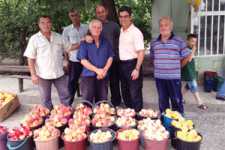The Joy In Serving “Georgian” Peach Farmers

In 1961, with the support of President John F. Kennedy, the U.S. Congress declared that “a principal objective of the foreign policy of the United States is the encouragement and sustained support of the people of developing countries in their efforts to acquire the knowledge and resources essential to development and to build the economic, political, and social institutions which will improve the quality of their lives” (Foreign Assistance Act). The resulting creation of the U.S. Agency for International Development (USAID) more than 50 years ago has led to current efforts in more than 100 countries with the purpose of “furthering America’s foreign policy interests in expanding democracy and free markets while also extending a helping hand to people struggling to make a better life, recovering from a disaster, or striving to live in a free and democratic country. It is this caring that stands as a hallmark of the United States around the world.”
One program that is funded through USAID is the CNFA “Farmer-to-Farmer” program that “provides opportunities for U.S. farmers, agribusiness professionals, and other agriculturists to help contribute to democracy-building and the development of a market economy by sharing their expertise with aspiring entrepreneurs across the globe.” I had the great privilege of participating as a volunteer in this program during this past year in the Republic of Georgia. This small country has the Black Sea on its western border and shares borders with Turkey and Armenia to the south, Azerbaijan to the south and east, and Russia to the north. This scenically beautiful country has land area slightly smaller than my home state of South Carolina. Georgia received its independence from the former Soviet Union in 1991 and it is now a democratic republic with strong ties to the U.S. The population of 4.5 million people is primarily Orthodox Christian and there are historic churches and monasteries dotting the foothills of the majestic Caucasus mountains.
Georgia is known for its 8,000-year history of making wine. They also produce citrus near the Black Sea, walnuts, pome fruit, and stone fruit. Both stone fruit and winegrapes are primarily grown in the Kakheti region. As a result of conflicts with Russia (including the Five-Day War in August 2008), the Russian border has been closed to Georgian exports (wine, fruit, etc.). Russia was formerly the single largest importer of Georgian wine and fruits, so the border closure has resulted in oversupply, poor prices to producers, and the need to increase exports to other neighboring countries.
Looking For Advice
My time in Georgia involved teaching a week-long, intensive “Peach Growing 101” course, and visiting new and established production orchards, markets, and storage facilities. I diagnosed orchard management and production problems and offered advice and solutions. I demonstrated pruning and thinning techniques and discussed fruit maturity assessment and postharvest management issues. In total, during two trips, I spent four weeks both educating and learning from my warm Georgian friends.
Interestingly, from a practical farming perspective, many of the issues and problems they experience are similar to those of the growers here in the U.S. However, unlike the U.S., with our land grant universities and Cooperative Extension Service, they have no state-funded experts to come and advise them or
educate them. Further, their ability to extend the shelflife of fruit through refrigeration (both for storage and transport) is historically lacking. However, I did visit a brand new, state-of-the-art cold storage facility in Tbilisi, the capital city, which has the capacity to handle 7,000 tons of meat, fruit, and vegetables. This is the largest such facility in the country and it should be a terrific new resource for Georgian growers.
The Georgian people are warm and hospitable. The country is beautiful, the cuisine is delicious, and the hospitality is memorable. Why not visit there one day and even go on one of their famous wine tours?
Click here to watch a video in which Layne is interviewed by David Birkadze, who hosts the national, weekly “Our Farm” television program each week in the Republic of Georgia.










